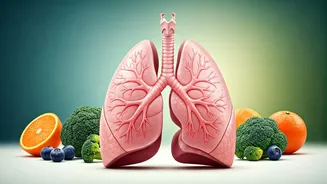Dairy's Potential Downsides
Dairy products, while often considered a staple, can sometimes cause problems for individuals with respiratory issues. For some people, dairy might trigger
increased mucus production, which can clog airways and make breathing more difficult. This is not a universal reaction; many people consume dairy without issues. However, if you find yourself experiencing increased congestion or discomfort after consuming dairy, it might be worth considering its impact on your lungs. Monitoring your body's response is key to understanding whether dairy affects your respiratory health, and if so, modifying your diet accordingly could offer significant benefits to your respiratory well-being. Consider consulting a medical professional to get a tailored opinion.
Processed Food Concerns
Processed foods are often packed with additives, preservatives, and unhealthy fats that can contribute to inflammation throughout the body, including the lungs. These artificial ingredients can trigger inflammatory responses in the respiratory system, worsening existing conditions like asthma or chronic obstructive pulmonary disease (COPD). The high sodium content in many processed foods can also lead to fluid retention, further contributing to respiratory difficulties. Regularly consuming processed foods may compromise lung health and make breathing more challenging. Opting for fresh, whole foods is always a better choice. A focus on minimizing your intake of processed foods will contribute to better respiratory health in the long run.
Salty Food Impacts
Excessive salt intake can lead to fluid retention, which can be detrimental to lung health. When the body retains excess fluid, it can accumulate in the lungs, making it harder to breathe efficiently. This added strain on the respiratory system can exacerbate conditions like asthma and COPD. Foods high in sodium, such as canned soups, processed meats, and salty snacks, should be consumed sparingly. By reducing your sodium intake, you can minimize fluid retention and lessen the burden on your lungs. Making informed food choices and understanding the impact of salt can significantly improve your respiratory health and enhance overall well-being. Always consult with a healthcare professional to identify your specific health needs and ensure that you're taking care of your body.
Sugary Drink Consequences
Sugary drinks are linked to increased inflammation, which can affect the respiratory system. The high sugar content in these beverages can trigger inflammation throughout the body, making it harder for the lungs to function optimally. Consuming sugary drinks regularly might increase the likelihood of respiratory infections and other conditions. For individuals with asthma or other respiratory issues, sugary drinks could worsen their symptoms. Choosing water, herbal teas, or other unsweetened beverages instead can help maintain lung health. Make sure to stay away from the consumption of sugary drinks to enhance your lung health and to reduce the risk of respiratory problems.
Refined Grain Implications
Refined grains, such as white bread and pasta, are often low in nutrients and high in easily digestible carbohydrates. These can lead to inflammation and might contribute to respiratory problems. Foods made with refined grains often lack the fiber and nutrients that support overall health and a robust immune system. A diet heavy in refined grains might contribute to increased inflammation in the body, which can affect the lungs. Opting for whole grains, which are higher in fiber and nutrients, is generally a healthier choice and could help reduce the risk of respiratory issues. Always try to make better food choices to ensure that you are staying healthy and fit.
Fried Food Hazards
Fried foods are typically cooked in oils that, when heated, can release harmful compounds. These compounds can irritate the lungs and contribute to inflammation. The high-fat content in fried foods also slows down digestion and can potentially put strain on the body, indirectly impacting respiratory health. Frequent consumption of fried foods is associated with increased risks of respiratory issues. Choosing baked, grilled, or steamed foods instead can help minimize the intake of harmful substances and promote better lung function. Pay attention to how the food is prepared, and try to make better choices to protect your respiratory health.
Alcohol and Lungs
Alcohol can sometimes have adverse effects on the lungs. Excessive alcohol consumption has been associated with increased susceptibility to respiratory infections, as it can weaken the immune system. Alcohol can also irritate the airways and exacerbate existing respiratory conditions. It's crucial to consume alcohol in moderation to protect lung health. For those with respiratory issues, it's wise to limit or avoid alcohol altogether. Making informed decisions regarding alcohol consumption is important for maintaining lung health and overall well-being. Always talk to a medical professional.














